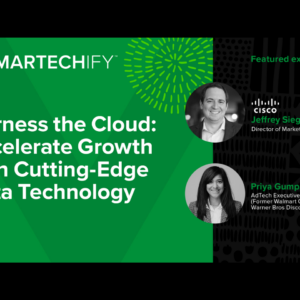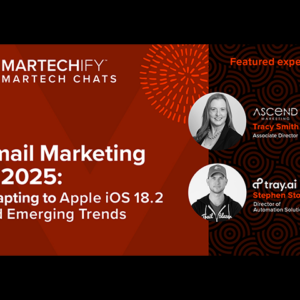Marketing from the Frontlines: How Amanda Rabideau’s Client-First Approach Built Two Successful Companies
- Amanda Rabideau, the Founder of promanda and ARCH Collective
- AI and Automation, Customer Experience (CX), Lead Gen / Lead Mgmt
At age 22, Amanda Rabideau made an offhand comment that would unknowingly shape her entire career: “I want to be a professional Amanda.”
Twenty years later, that seemingly casual remark has manifested into promanda, an AI-powered SaaS platform helping marketers create messaging in minutes instead of months.
We interviewed Amanda Rabideau and we’re excited to bring you her thoughts on how speaking directly to clients shaped her unique marketing approach and business success story.
Twenty years later, that seemingly casual remark has manifested into promanda, an AI-powered SaaS platform helping marketers create messaging in minutes instead of months.
We interviewed Amanda Rabideau and we’re excited to bring you her thoughts on how speaking directly to clients shaped her unique marketing approach and business success story.
Learning the client-first approach at OraMetrix
Unlike many marketers who begin their careers behind desks analyzing data, Amanda started in the field, talking directly to customers. Her first job out of college was at OraMetrix, an orthodontic technology startup where she began in customer success before “harassing the VP of sales” into giving her a sales territory.
“I started in this business by talking to customers and hearing what they hated and hearing what they loved and hearing their problems,” Amanda explains. This frontline experience gave her insights that office-bound marketers rarely access.
By her second year, she had become the company’s top salesperson, a position she maintained for the next three years. When she was ready for a new challenge, Amanda’s CEO didn’t want to lose her talents and asked her to “figure out how to grow the business without being in direct sales.”
This led to a pivotal moment in Amanda’s marketing journey. During a routine dentist appointment, she noticed something critical about the orthodontic referral process: Hygienists played a much more significant role than anyone had realized. Using this insight, Amanda developed an entire hygienist-focused referral program that drove more leads to orthodontists.
“I was out there hearing what was actually going on,” she explained. This foundation of customer-first thinking would become the hallmark of her marketing philosophy.
Amanda’s lessons from her days at OraMetrix:
— Direct customer interaction provides marketing insights that data alone cannot
— Real-world observation can reveal opportunities missed by traditional market research
— Solutions built from customer conversations tend to be more effective
— The best marketers understand both sales and customer success perspectives
“I started in this business by talking to customers and hearing what they hated and hearing what they loved and hearing their problems,” Amanda explains. This frontline experience gave her insights that office-bound marketers rarely access.
By her second year, she had become the company’s top salesperson, a position she maintained for the next three years. When she was ready for a new challenge, Amanda’s CEO didn’t want to lose her talents and asked her to “figure out how to grow the business without being in direct sales.”
This led to a pivotal moment in Amanda’s marketing journey. During a routine dentist appointment, she noticed something critical about the orthodontic referral process: Hygienists played a much more significant role than anyone had realized. Using this insight, Amanda developed an entire hygienist-focused referral program that drove more leads to orthodontists.
“I was out there hearing what was actually going on,” she explained. This foundation of customer-first thinking would become the hallmark of her marketing philosophy.
Amanda’s lessons from her days at OraMetrix:
— Direct customer interaction provides marketing insights that data alone cannot
— Real-world observation can reveal opportunities missed by traditional market research
— Solutions built from customer conversations tend to be more effective
— The best marketers understand both sales and customer success perspectives
Following intuition over corporate bureaucracy
After OraMetrix, Amanda’s path took her through Goldman Sachs and MarketBridge before landing at CoreLogic, where she led product marketing for one of their largest businesses. But it was a negative experience at CoreLogic that sparked her most profound transformation.
After being promised a promotion that was later denied (despite having email confirmation), Amanda reached a breaking point. “It changed something in me,” she recalls. “I was like, alright, I’m going to do things my way. I’m not going to follow this corporate bureaucratic approach that isn’t working for me.”
This decision to trust her instincts rather than follow conventional corporate practices yielded surprising results. Her work began to generate more impact, validating her approach. During the interview process at CoreLogic, she had been identified as a “builder” by the Chief People Officer—someone who thrives when creating something new. This assessment proved accurate as Amanda flourished when building her own approach to marketing.
The experience at CoreLogic directly informed her next move. After returning from maternity leave, Amanda began interviewing for CMO positions at several Series A startups. As she prepared marketing plans for these interviews, a realization struck her: “These are all the same.”
She jokingly told her husband, “I should just take a job with all of them and I’d be super efficient.” Once the idea was voiced, Amanda couldn’t let it go. She recognized a gap in the market, and in 2019—before the term “fractional” became commonplace—she left CoreLogic to start ARCH Collective, a fractional CMO practice.
Summarizing Amanda’s takeaways at CoreLogic:
— Sometimes career setbacks can trigger your most innovative thinking
— Trusting your instincts can often lead to better results than following established protocols
— Market gaps often become visible when you’re actively seeking new opportunities
– Innovation sometimes comes from necessity and frustration with the status quo
After being promised a promotion that was later denied (despite having email confirmation), Amanda reached a breaking point. “It changed something in me,” she recalls. “I was like, alright, I’m going to do things my way. I’m not going to follow this corporate bureaucratic approach that isn’t working for me.”
This decision to trust her instincts rather than follow conventional corporate practices yielded surprising results. Her work began to generate more impact, validating her approach. During the interview process at CoreLogic, she had been identified as a “builder” by the Chief People Officer—someone who thrives when creating something new. This assessment proved accurate as Amanda flourished when building her own approach to marketing.
The experience at CoreLogic directly informed her next move. After returning from maternity leave, Amanda began interviewing for CMO positions at several Series A startups. As she prepared marketing plans for these interviews, a realization struck her: “These are all the same.”
She jokingly told her husband, “I should just take a job with all of them and I’d be super efficient.” Once the idea was voiced, Amanda couldn’t let it go. She recognized a gap in the market, and in 2019—before the term “fractional” became commonplace—she left CoreLogic to start ARCH Collective, a fractional CMO practice.
Summarizing Amanda’s takeaways at CoreLogic:
— Sometimes career setbacks can trigger your most innovative thinking
— Trusting your instincts can often lead to better results than following established protocols
— Market gaps often become visible when you’re actively seeking new opportunities
– Innovation sometimes comes from necessity and frustration with the status quo
The birth of promanda—a need recognized through client conversations
While running ARCH Collective, Amanda found herself repeatedly helping clients with messaging creation. As a former product marketer, she recognized this “zero to one” messaging challenge was universal. Creating compelling messaging from scratch was time-consuming and stressful for marketers everywhere.
“Messaging and marketing in general—I think are undervalued and what it takes to do what we do really well is vastly underestimated,” Amanda explains.
In late 2023, curious about whether AI could help, she hired a developer to build a software solution. By early 2024, she was testing it with her own clients, who didn’t even know she was using AI assistance. The results were impressive, and when friends who owned agencies asked to use it, Amanda began to see a bigger opportunity.
After gathering feedback from 13 beta testers—both agencies and freelance marketers—she refined the product and officially launched promanda in February 2024. The platform’s mission: Turn the messaging creation process from “months to minutes.”
Amanda describes the messaging creation problem using an art analogy: “The fear of the blank page… You know what it took to sit down and formulate those thoughts and come up with it and start it… You probably cleaned your whole house before you did it.”
She compares good messaging to a seemingly simple Rothko painting: “To achieve simplicity is one of the hardest things to do.”
The lessons Amanda learned from her product marketing days helped her as founder of promanda:
— Problems you personally experience often represent market opportunities
— Testing solutions with real clients provides invaluable validation
— The most valuable innovations solve genuine pain points
— Messaging creation is undervalued but critical to business success
— AI can help with creative processes that previously required months of work
“Messaging and marketing in general—I think are undervalued and what it takes to do what we do really well is vastly underestimated,” Amanda explains.
In late 2023, curious about whether AI could help, she hired a developer to build a software solution. By early 2024, she was testing it with her own clients, who didn’t even know she was using AI assistance. The results were impressive, and when friends who owned agencies asked to use it, Amanda began to see a bigger opportunity.
After gathering feedback from 13 beta testers—both agencies and freelance marketers—she refined the product and officially launched promanda in February 2024. The platform’s mission: Turn the messaging creation process from “months to minutes.”
Amanda describes the messaging creation problem using an art analogy: “The fear of the blank page… You know what it took to sit down and formulate those thoughts and come up with it and start it… You probably cleaned your whole house before you did it.”
She compares good messaging to a seemingly simple Rothko painting: “To achieve simplicity is one of the hardest things to do.”
The lessons Amanda learned from her product marketing days helped her as founder of promanda:
— Problems you personally experience often represent market opportunities
— Testing solutions with real clients provides invaluable validation
— The most valuable innovations solve genuine pain points
— Messaging creation is undervalued but critical to business success
— AI can help with creative processes that previously required months of work
Bias toward action in building promanda
What stands out about Amanda’s approach to building promanda is her bias toward action. Rather than spending months on market research or building elaborate marketing funnels, she focused on getting the product into users’ hands.
When asked about her marketing strategy for promanda, Amanda’s answer was refreshingly straightforward: Her number one source for leads and clients is simply “getting on the phone.”
“Right now, I mean, it really comes down to, it’s a function of budgeting and time,” she explains. “I want to get people on, I want to get people using it, I want to hear about what’s going on.”
This direct approach serves multiple purposes. Beyond just making sales, these conversations provide continuous feedback about the product. They’re an extension of her voice-of-client research methodology that’s been central to her success throughout her career.
“On every interview I did, or whenever I talk to a client or someone who potentially could be a client and maybe didn’t end up being one, they would say something like, ‘What’s one thing I can do today to grow my business?’ I’m like, pick up the phone and talk to your clients.”
Amanda’s bootstrapping experience has reinforced this action-oriented approach. With limited resources, she can’t afford elaborate marketing campaigns or complex tech stacks. Her martech stack is intentionally lean—just HubSpot, SendGrid, Stripe, and a few other essential tools.
Rather than view these constraints as limitations, Amanda sees them as focusing mechanisms. They force her to prioritize what truly matters: direct customer relationships and product improvement. Even as she pursues venture funding, she remains committed to continuing these direct customer conversations.
She cites a lesson from Jerry Seinfeld that resonates with her approach: “If I need to know how to do something, I’ll learn it when I need to.” This philosophy has carried her through unfamiliar territory like fundraising. “I’ll figure it out,” she says. “It may be clunky. There may be mistakes along the way, but I’ll figure it out.”
Amanda’s wisdom as a startup founder can be summarized as follows:
— Direct sales conversations serve both revenue and research purposes
— Constraints can become advantages that force focus on what matters
— You don’t need to know everything before starting—you’ll learn along the way
— Continuous customer feedback is more valuable than perfect planning
— Action creates momentum that planning alone cannot
When asked about her marketing strategy for promanda, Amanda’s answer was refreshingly straightforward: Her number one source for leads and clients is simply “getting on the phone.”
“Right now, I mean, it really comes down to, it’s a function of budgeting and time,” she explains. “I want to get people on, I want to get people using it, I want to hear about what’s going on.”
This direct approach serves multiple purposes. Beyond just making sales, these conversations provide continuous feedback about the product. They’re an extension of her voice-of-client research methodology that’s been central to her success throughout her career.
“On every interview I did, or whenever I talk to a client or someone who potentially could be a client and maybe didn’t end up being one, they would say something like, ‘What’s one thing I can do today to grow my business?’ I’m like, pick up the phone and talk to your clients.”
Amanda’s bootstrapping experience has reinforced this action-oriented approach. With limited resources, she can’t afford elaborate marketing campaigns or complex tech stacks. Her martech stack is intentionally lean—just HubSpot, SendGrid, Stripe, and a few other essential tools.
Rather than view these constraints as limitations, Amanda sees them as focusing mechanisms. They force her to prioritize what truly matters: direct customer relationships and product improvement. Even as she pursues venture funding, she remains committed to continuing these direct customer conversations.
She cites a lesson from Jerry Seinfeld that resonates with her approach: “If I need to know how to do something, I’ll learn it when I need to.” This philosophy has carried her through unfamiliar territory like fundraising. “I’ll figure it out,” she says. “It may be clunky. There may be mistakes along the way, but I’ll figure it out.”
Amanda’s wisdom as a startup founder can be summarized as follows:
— Direct sales conversations serve both revenue and research purposes
— Constraints can become advantages that force focus on what matters
— You don’t need to know everything before starting—you’ll learn along the way
— Continuous customer feedback is more valuable than perfect planning
— Action creates momentum that planning alone cannot
Authentic marketing vs. strategic planning
Amanda’s approach to marketing promanda reflects her broader philosophy about authenticity. When she started ARCH Collective, she was focused on creating a “perfect” and “curated” image. The result? Feedback that her LinkedIn persona didn’t match her warm, friendly real-life demeanor.
This realization led to a pivotal shift in her approach to promanda’s marketing. “I am going to do whatever feels right,” she decided. “If it feels authentic for me to put it out there, I will. If it doesn’t, then I won’t.”
This might sound casual, even haphazard, but it’s intentionally aligned with her values: “If I could make a billion dollars, but if I’ve done it pretending to be someone I’m not, that is not success to me.”
Amanda’s authentic approach is partly inspired by her great-grandmother, who immigrated from Poland and lived to 95. When faced with changing social norms, her great-grandmother’s philosophy was simple: “You gotta change with the times. You just gotta go with it.”
This willingness to adapt without losing her authentic self has served Amanda well in the rapidly evolving marketing landscape. “I’m not a 25-year-old startup person,” she acknowledges, “but it’s like you gotta go with the times.”
Encapsulating Amanda’s founder-led marketing strategy:
— Authenticity resonates more than perfection in marketing
— Your personal brand should reflect who you really are
— Adaptability and authenticity can coexist
— Concern about criticism often prevents effective action
— Success without authenticity isn’t really success
This realization led to a pivotal shift in her approach to promanda’s marketing. “I am going to do whatever feels right,” she decided. “If it feels authentic for me to put it out there, I will. If it doesn’t, then I won’t.”
This might sound casual, even haphazard, but it’s intentionally aligned with her values: “If I could make a billion dollars, but if I’ve done it pretending to be someone I’m not, that is not success to me.”
Amanda’s authentic approach is partly inspired by her great-grandmother, who immigrated from Poland and lived to 95. When faced with changing social norms, her great-grandmother’s philosophy was simple: “You gotta change with the times. You just gotta go with it.”
This willingness to adapt without losing her authentic self has served Amanda well in the rapidly evolving marketing landscape. “I’m not a 25-year-old startup person,” she acknowledges, “but it’s like you gotta go with the times.”
Encapsulating Amanda’s founder-led marketing strategy:
— Authenticity resonates more than perfection in marketing
— Your personal brand should reflect who you really are
— Adaptability and authenticity can coexist
— Concern about criticism often prevents effective action
— Success without authenticity isn’t really success
Conclusion
Amanda Rabideau’s journey from orthodontic sales representative to AI software founder illuminates a powerful truth about marketing: it works best when built from direct client conversations. By consistently prioritizing customer insights over theoretical strategies, Amanda has built two successful businesses that solve real problems.













